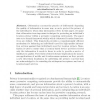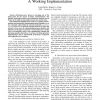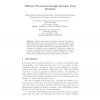130 search results - page 5 / 26 » Location Privacy Protection Through Obfuscation-Based Techni... |
PERVASIVE
2005
Springer
14 years 1 months ago
2005
Springer
Obfuscation concerns the practice of deliberately degrading the quality of information in some way, so as to protect the privacy of the individual to whom that information refers. ...
ICC
2009
IEEE
13 years 5 months ago
2009
IEEE
Protecting users' privacy is becoming one of the rising issues for the success of future communications. The Internet in particular, with its open architecture, presents sever...
WISA
2005
Springer
14 years 1 months ago
2005
Springer
Abstract. Reverse engineering of executable programs, by disassembling them and then using program analyses to recover high level semantic information, plays an important role in a...
IJISEC
2007
13 years 7 months ago
2007
The paper extends the idea of negative representations of information for enhancing privacy. Simply put, a set DB of data elements can be represented in terms of its complement set...
SIGMOD
2008
ACM
14 years 7 months ago
2008
ACM
Mobile devices equipped with positioning capabilities (e.g., GPS) can ask location-dependent queries to Location Based Services (LBS). To protect privacy, the user location must n...



